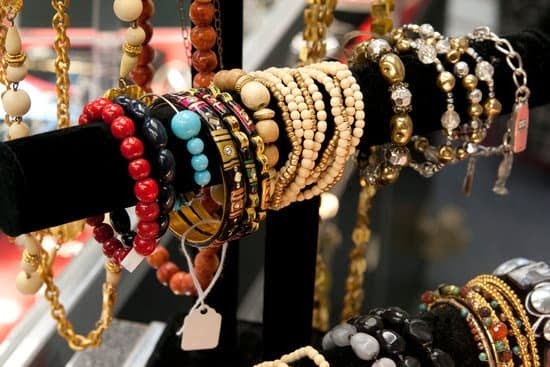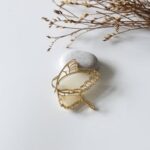Gold jewelry has long been cherished for its exquisite beauty and elegance. From delicate necklaces to intricate bracelets, gold accessories have the ability to instantly elevate any outfit and add a touch of sophistication. With its timeless appeal and enduring value, it is no wonder that gold jewelry is often a prized possession for many individuals.
However, when it comes to wearing gold jewelry in the shower, there seems to be a fair amount of uncertainty and confusion. Can you really wear your favorite gold necklace or ring while taking a refreshing shower? In this article, we delve into the topic of showering with gold jewelry to provide you with all the information you need to make an informed decision.
Gold is known for its durability and resistance to tarnish or corrosion. It is able to withstand a variety of environments without losing its luster or value. But what about exposing gold jewelry to water on a regular basis? We will explore the myths and realities surrounding this practice, debunking common misconceptions along the way.
Additionally, we will assess the potential risks and effects that water may have on gold jewelry. Does prolonged exposure to water affect its appearance or structural integrity? We will consult experts in the field of jewelry-making and gain insight into their professional opinions regarding showering with gold accessories.
Caring for precious gems can sometimes be daunting, especially when it comes to cleaning and maintenance. We will provide you with tips and best practices for properly caring for your gold jewelry if you do choose to wear it in the shower. Furthermore, we will present alternative options for those who prefer not to risk wearing their gold jewelry during their daily cleansing routine.
To shed light on this topic, we will include personal experiences from individuals who actively wear their gold jewelry in the shower. These stories and testimonials offer firsthand accounts of how different individuals have treated their cherished pieces while bathing.
By providing comprehensive information regarding showering with gold jewelry, our aim is to equip readers with knowledge that will enable them to make a well-informed decision. So, whether you have just purchased a stunning gold necklace or are simply curious about the topic, join us as we delve into the world of showering with gold jewelry.
The Value of Gold
Gold has been valued for its beauty and elegance throughout history. From ancient civilizations to modern times, gold jewelry has been treasured for its lustrous shine and timeless appeal. However, many people are unsure about whether it is safe to wear gold jewelry in certain environments such as the shower. In this section, we will explore the value of gold and its durability in different environments.
Gold is a highly durable metal that can withstand various environmental conditions. Its corrosion resistance makes it less prone to rust or tarnish compared to other metals. This is because gold does not react with moisture or oxygen, which are common elements found in the shower environment. Therefore, there is generally no harm in wearing gold jewelry while bathing.
However, it’s important to note that the durability of gold varies depending on its purity and other factors such as the presence of gemstones or delicate designs. For example, 24-karat pure gold is more malleable and may be more susceptible to damage than lower karat alloys. Additionally, if your gold jewelry features gemstones that are not suitable for exposure to water, it is advisable to remove them before showering to avoid potential damage.
Overall, while gold jewelry is generally durable enough to be worn in the shower without major issues, it’s always a good idea to consider the specific design and composition of your pieces before exposing them to water. Taking proper care of your gold jewelry will help ensure their longevity and retain their beauty.
In the next section, we will hear from experts in the field who can provide valuable advice on caring for your precious gems and maintaining your gold jewelry’s appearance over time.
The Myth vs. Reality
Gold jewelry has long been associated with beauty and elegance. Whether it’s a necklace, bracelet, or pair of earrings, gold jewelry adds a touch of luxury to any outfit. However, there are several misconceptions about wearing gold jewelry in the shower that need to be debunked.
One common misconception is that showering with gold jewelry will cause it to lose its value or durability. In reality, gold is a highly durable material that can withstand exposure to water. Gold is resistant to tarnishing and corrosion, making it suitable for everyday wear, including in the shower.
Another myth is that water can damage the color or shine of gold jewelry. While it is true that chemicals such as chlorine can affect certain alloys used in gold jewelry, pure gold itself is not affected by water alone. Gold jewelry can still maintain its luster and color even when exposed to water regularly.
To ensure the longevity of your gold jewelry while showering, there are some best practices you can follow. Firstly, consider the quality and craftsmanship of your pieces. Well-made gold jewelry should be able to withstand regular contact with water without any issues. Additionally, it’s important to clean your gold jewelry regularly to remove any dirt or residue that may accumulate over time.
It’s also worth noting that specific gemstones set in gold may have different care requirements than the metal itself. For example, certain gemstones may be more susceptible to damage from prolonged exposure to water or changes in temperature. Therefore, it’s always advisable to consult with a jeweler or follow any care instructions provided for gemstone-containing pieces before wearing them in the shower.
The Impact of Water on Gold
Water is a common element found in everyday activities such as bathing, swimming, and washing our hands. With the popularity of wearing gold jewelry on a daily basis, it is essential to understand the potential risks and effects of exposing gold to water. This section will dive into the impact of water on gold and assess the potential risks involved.
Corrosion and Tarnishing
One of the primary concerns when it comes to exposing gold jewelry to water is corrosion and tarnishing. While gold itself is highly resistant to corrosion, the presence of other metals in the alloy can make it susceptible to corrosion when exposed to certain types of water.
Water that contains high levels of chlorine or sulfur, such as that found in swimming pools or hot springs, can cause damage to gold jewelry over time. The chemicals present in these waters can react with the metal components in gold alloys, leading to discoloration and tarnishing.
It is important to note that solid 24-karat gold jewelry is less likely to be affected by corrosion or tarnishing since it contains no other metals. However, most gold jewelry on the market today is made from lower karatage, which means it contains a percentage of other metals for added strength and durability. In these cases, it’s crucial to exercise caution when showering with gold jewelry.
Loss or Damage
Another risk associated with wearing gold jewelry in the shower is the potential for loss or damage. The slippery nature of soapy water coupled with vigorous movements can cause rings, bracelets, or necklaces to slip off and potentially get lost down the drain. Additionally, any intricate designs or gemstones attached to the jewelry may become damaged under running water or during rigorous scrubbing motions while showering.
To minimize these risks, it’s advisable to remove any delicate or valuable pieces before stepping into the shower. If you prefer not to part with your precious jewelry, consider using a jewelry pouch or dish to safely store them while showering. Taking these precautions can help prevent loss or damage and ensure the longevity of your gold jewelry.
Understanding the potential risks and effects of exposing gold jewelry to water is crucial for making informed decisions about whether or not to shower with your gold pieces. While solid 24-karat gold may be less susceptible to corrosion and tarnishing, lower karatage gold alloys can be more vulnerable.
It’s important to consider the specific properties of your gold jewelry and the type of water you are exposing it to. By taking appropriate steps to protect your precious pieces, you can enjoy their beauty and elegance for years to come.
Expert Advice
Showering with gold jewelry is a topic that often sparks debate and confusion among jewelry enthusiasts. Many wonder if it is safe to wear their precious gold pieces in the shower or if it may cause damage over time. To provide clarity on this matter, it is important to turn to the experts in the field – jewelers and goldsmiths who have extensive knowledge and experience with gold jewelry.
When it comes to wearing gold jewelry in the shower, expert advice generally leans towards caution. While gold itself is a durable metal, there are other components of your jewelry, such as gemstones or clasps, that may be more susceptible to damage from prolonged exposure to water. Some jewelers suggest removing your gold jewelry before showers to minimize these risks.
It is also important to consider the type of water you are exposed to. Saltwater, chlorine, and harsh chemicals found in some tap water can potentially tarnish or corrode your gold jewelry over time. Therefore, it is recommended to take off your gold jewelry before swimming in pools or at the beach where exposure to these elements is more likely.
However, not all experts agree on this matter. Some jewelers argue that occasional exposure to water during showers will not harm well-made and properly cared for gold jewelry. They recommend ensuring your piece of jewelry has been professionally cleaned and inspected regularly by a jeweler to maintain its durability and prevent any potential issues.
Caring for Your Precious Gems
As with any valuable possession, it is important to properly care for your gold jewelry to maintain its beauty and longevity. Regular cleaning and maintenance can help prevent damage and ensure that your precious gems continue to shine. Here are some useful tips and best practices for caring for your gold jewelry:
- Gentle Cleaning: Use a mild soap or specialized jewelry cleaner specifically designed for gold. Avoid using harsh chemicals or abrasive materials as they can scratch or tarnish the surface of your jewelry.
- Soft Brush or Cloth: To clean intricate details or hard-to-reach areas, use a soft brush with gentle bristles or a microfiber cloth. Be careful not to apply too much pressure to avoid damaging delicate gemstones or settings.
- Storing Properly: When you’re not wearing your gold jewelry, store it in a clean and dry place, preferably in a fabric-lined jewelry box or pouch. This will help prevent scratches and keep it away from exposure to moisture, which can cause tarnishing.
- Avoid Excessive Heat or Cold: Extreme temperatures can affect the integrity of your gold jewelry. Avoid exposing it to direct sunlight, extreme heat sources such as saunas, or extreme cold temperatures such as freezing air conditioning.
- Regular Inspections: Periodically inspect your gold jewelry for any signs of damage, loose stones, or worn-out prongs. If you notice any issues, take it to a reputable jeweler for professional inspection and repair.
By following these tips and best practices, you can keep your gold jewelry looking beautiful and well-maintained for years to come.
| Tips | Best Practices |
|---|---|
| Use a mild soap or specialized jewelry cleaner made specifically for gold. | Store your gold jewelry in a clean and dry place, preferably in a fabric-lined jewelry box or pouch. |
| Clean gently with a soft brush or microfiber cloth to avoid scratching delicate gemstones or settings. | Avoid exposing your gold jewelry to extreme heat or cold temperatures. |
| Regularly inspect your gold jewelry for any signs of damage or loose stones. | If you notice any issues, take it to a reputable jeweler for professional inspection and repair. |
Alternative Options
Gold jewelry is undoubtedly beautiful and elegant, but there are concerns about whether it can be worn in the shower without causing any damage. While some people may choose to take the risk, there are alternative options available for those who want to avoid potential risks and keep their gold jewelry in pristine condition.
One popular alternative to wearing gold jewelry in the shower is opting for gold-plated or gold-filled pieces. Gold plating involves a thin layer of gold being applied to a base metal, while gold-filled items have a thicker layer of gold that is bonded to a base metal. These options provide a more affordable and durable alternative to solid gold jewelry, making them more resistant to the effects of water.
Another alternative option is wearing waterproof or water-resistant jewelry. There are many brands and designs specifically made for wear in water environments. These pieces are typically crafted with materials such as stainless steel, titanium, or silicone that are known for their resistance to water damage. They offer a stylish and practical option for individuals who want to enjoy the convenience of wearing jewelry while showering or participating in water-related activities.
Lastly, if you prefer not to wear any type of jewelry in the shower, but still want to accessorize your outfits, consider investing in non-jewelry accessories such as hair accessories or scarves. These alternatives can add an extra touch of style without the worry of damaging your precious gold jewelry.
| Option | Description |
|---|---|
| Gold-Plated/Gold-Filled Jewelry | Affordable and durable alternatives with a layer of gold applied or bonded to a base metal. |
| Waterproof/Water-Resistant Jewelry | Crafted with materials like stainless steel, titanium, or silicone that are resistant to water damage. |
| Non-Jewelry Accessories | Hair accessories or scarves that add style without needing to wear jewelry in the shower. |
Personal Experiences
While there are debates and expert advice surrounding the question of whether or not you should shower with gold jewelry, many individuals have their own personal experiences and stories to share. Some people claim to have had no issues with wearing their gold jewelry in the shower, while others have experienced negative effects. These personal testimonies can provide valuable insights into the practicality of showering with gold jewelry.
One individual, Sarah Thompson, shared her positive experience of wearing her gold necklace in the shower for years without any noticeable damage. She explained that she never removes her necklace, regardless of where she is or what she’s doing, and it has remained in perfect condition. Sarah believes that the purity and quality of the gold make a difference in its resistance to water damage.
On the other hand, Joe Rodriguez discovered the hard way that showering with his gold ring was not a good idea. After a few weeks of regularly wearing his ring in the shower, he noticed discoloration on the band. He immediately took it to a jeweler who informed him that prolonged exposure to water and soap can cause damage to gold jewelry over time. Joe learned his lesson and now removes his gold ring before entering the shower.
These personal experiences highlight the importance of understanding how different factors such as water quality, duration of exposure, and individual body chemistry can affect gold jewelry in various ways. It is essential to take these factors into consideration when deciding whether or not to wear your gold jewelry in the shower.
While personal experiences may vary greatly, it is always recommended to consult with jewelers or professionals when making decisions about wearing your valuable accessories in environments like showers or swimming pools. Their expertise will be invaluable in helping you understand the potential risks and effects of exposing your gold jewelry to water regularly.
Ultimately, by hearing stories and testimonials from individuals who have had both positive and negative experiences with wearing gold jewelry in the shower, you can make a more informed decision about how to care for your precious pieces.
Conclusion
In conclusion, when it comes to showering with gold jewelry, it is important to make an informed decision based on the facts and expert advice. While gold is a durable material that can withstand different environments, prolonged exposure to water can still have potential risks and effects on your jewelry. It is essential to understand these risks and take proper care of your precious gems.
Throughout this article, we have debunked common misconceptions about wearing gold jewelry in the shower. Contrary to popular belief, showering with gold jewelry does not necessarily cause immediate damage or discoloration. However, it is important to note that contact with certain chemicals present in soaps, shampoos, and other bath products can have long-term effects on your jewelry if not properly cleaned and maintained.
Jewelers and goldsmiths emphasize the importance of taking precautionary measures when showering with gold jewelry. They recommend removing jewelry before bathing or opting for alternative options such as waterproof coatings or selecting more durable pieces specifically designed for constant water exposure. Cleaning your gold jewelry regularly using gentle techniques and avoiding harsh chemicals will also help maintain its shine and longevity.
Ultimately, the decision of whether or not to shower with gold jewelry should be based on personal preference and careful consideration of the potential risks involved. By understanding how water can impact gold and following expert advice for cleaning and maintenance, you can enjoy the beauty and elegance of your gold jewelry while minimizing the chances of any damage or deterioration.
Frequently Asked Questions
Can you wear 14K gold in the shower?
It is generally safe to wear 14K gold in the shower, as long as it does not contain gemstones or delicate components that may be affected by exposure to water or chemicals. However, it is important to note that soaps, shampoos, and other bathing products can create a film on the surface of the gold, dulling its shine over time.
To maintain the luster of your 14K gold jewelry, it is recommended to remove them before showering and clean them separately using mild jewelry cleaner.
Should I take my gold necklace off when I shower?
It is generally advisable to remove your gold necklace when you shower. While 14K gold itself is resistant to tarnishing or corrosion due to exposure to water, other factors such as soap residue or rough handling may gradually impact its appearance or cause it to lose its shine.
Additionally, if your necklace has intricate designs or contains gemstones that may be sensitive to water damage or chemical exposure, removing it before showering can help preserve its condition and longevity.
Can I wear 14K gold in the pool?
While 14K gold is generally resistant to damage from exposure to pool water, there are some factors worth considering before wearing it in a pool. Chlorine and other chemicals commonly found in pools can potentially affect the alloy used in 14K gold and cause slight discoloration over time.
Furthermore, if your gold jewelry contains gemstones or delicate components that could be damaged by water pressure, rough surfaces within the pool, or accidental impact while swimming, it is advisable to remove them beforehand for their protection.

Welcome to my jewelry blog! My name is Sarah and I am the owner of this blog.
I love making jewelry and sharing my creations with others.
So whether you’re someone who loves wearing jewelry yourself or simply enjoys learning about it, be sure to check out my blog for insightful posts on everything related to this exciting topic!





